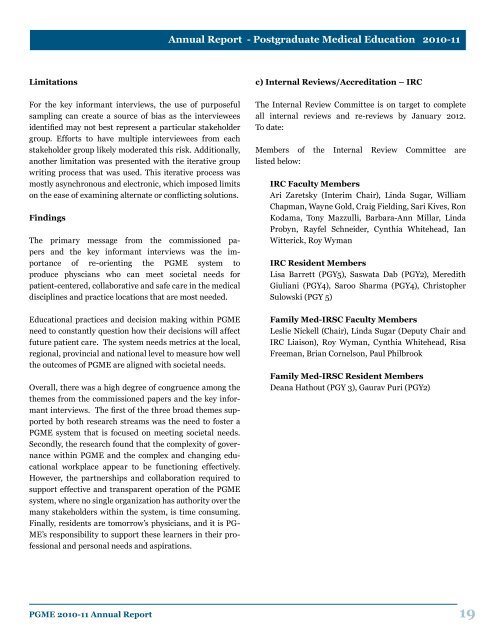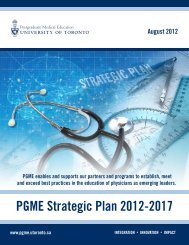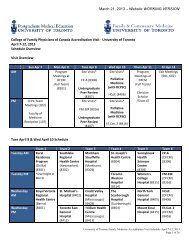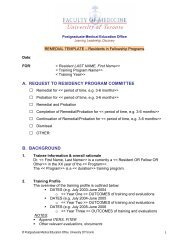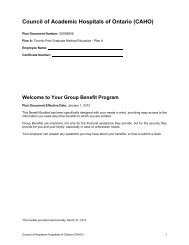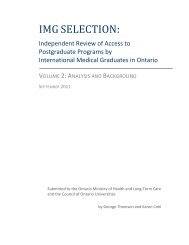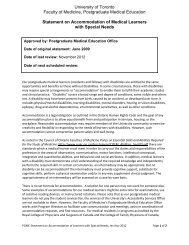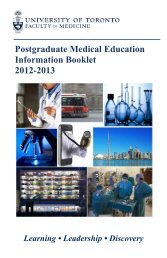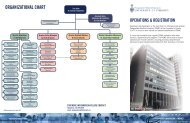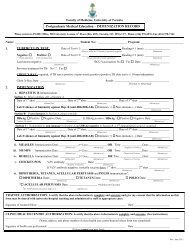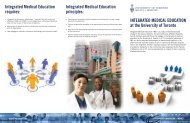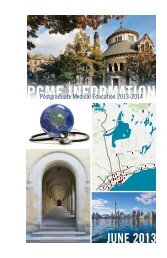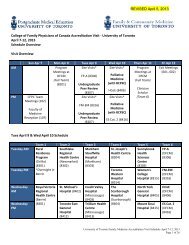PGME Annual Report 2011 - Post Graduate Medical Education ...
PGME Annual Report 2011 - Post Graduate Medical Education ...
PGME Annual Report 2011 - Post Graduate Medical Education ...
Create successful ePaper yourself
Turn your PDF publications into a flip-book with our unique Google optimized e-Paper software.
<strong>Annual</strong> <strong>Report</strong> - <strong>Post</strong>graduate <strong>Medical</strong> <strong>Education</strong> 2010-11<br />
Limitations<br />
For the key informant interviews, the use of purposeful<br />
sampling can create a source of bias as the interviewees<br />
identified may not best represent a particular stakeholder<br />
group. Efforts to have multiple interviewees from each<br />
stakeholder group likely moderated this risk. Additionally,<br />
another limitation was presented with the iterative group<br />
writing process that was used. This iterative process was<br />
mostly asynchronous and electronic, which imposed limits<br />
on the ease of examining alternate or conflicting solutions.<br />
Findings<br />
The primary message from the commissioned papers<br />
and the key informant interviews was the importance<br />
of re-orienting the <strong>PGME</strong> system to<br />
produce physcians who can meet societal needs for<br />
patient-centered, collaborative and safe care in the medical<br />
disciplines and practice locations that are most needed.<br />
<strong>Education</strong>al practices and decision making within <strong>PGME</strong><br />
need to constantly question how their decisions will affect<br />
future patient care. The system needs metrics at the local,<br />
regional, provincial and national level to measure how well<br />
the outcomes of <strong>PGME</strong> are aligned with societal needs.<br />
Overall, there was a high degree of congruence among the<br />
themes from the commissioned papers and the key informant<br />
interviews. The first of the three broad themes supported<br />
by both research streams was the need to foster a<br />
<strong>PGME</strong> system that is focused on meeting societal needs.<br />
Secondly, the research found that the complexity of governance<br />
within <strong>PGME</strong> and the complex and changing educational<br />
workplace appear to be functioning effectively.<br />
However, the partnerships and collaboration required to<br />
support effective and transparent operation of the <strong>PGME</strong><br />
system, where no single organization has authority over the<br />
many stakeholders within the system, is time consuming.<br />
Finally, residents are tomorrow’s physicians, and it is PG-<br />
ME’s responsibility to support these learners in their professional<br />
and personal needs and aspirations.<br />
c) Internal Reviews/Accreditation – IRC<br />
The Internal Review Committee is on target to complete<br />
all internal reviews and re-reviews by January 2012.<br />
To date:<br />
Members of the Internal Review Committee are<br />
listed below:<br />
IRC Faculty Members<br />
Ari Zaretsky (Interim Chair), Linda Sugar, William<br />
Chapman, Wayne Gold, Craig Fielding, Sari Kives, Ron<br />
Kodama, Tony Mazzulli, Barbara-Ann Millar, Linda<br />
Probyn, Rayfel Schneider, Cynthia Whitehead, Ian<br />
Witterick, Roy Wyman<br />
IRC Resident Members<br />
Lisa Barrett (PGY5), Saswata Dab (PGY2), Meredith<br />
Giuliani (PGY4), Saroo Sharma (PGY4), Christopher<br />
Sulowski (PGY 5)<br />
Family Med-IRSC Faculty Members<br />
Leslie Nickell (Chair), Linda Sugar (Deputy Chair and<br />
IRC Liaison), Roy Wyman, Cynthia Whitehead, Risa<br />
Freeman, Brian Cornelson, Paul Philbrook<br />
Family Med-IRSC Resident Members<br />
Deana Hathout (PGY 3), Gaurav Puri (PGY2)<br />
<strong>PGME</strong> 2010-11 <strong>Annual</strong> <strong>Report</strong><br />
19


